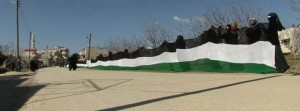Kafr Nabel Women Learn New Skills

A community training centre is offering a range of courses to help women find work and support their families.
Omar al-Hussein
(Kafr Nabel , Syria) – “I am no longer a burden, but a source of support.” This is the slogan written on one of the walls of a large room in the Mazaya Centre in the Free Syrian Army controlled city of Kafr Nabel.
Since opening in June 2013, the facility has provided training for approximately 160 women in skills such as sewing, embroidery, first aid and computing.

Kafr Nabel, which lies in the north west of Syria, has a population of approximately 35,000.
The Mazaya Centre’s first trainees graduated from their courses in sewing and embroidery.
A further 45 women have completed training in first aid that the centre hopes they will put the qualification to use in local hospitals.
“Work in the Centre began with volunteer-run courses for refugee women in Kafr Nabel,” Ghalia al-Rahhal, the director of Mazaya, told Damscus Bureau. “The Centre gradually expanded as demand increased, and we now work with women in Kafr Nabel and the surrounding villages, as well as refugee women.”
The trainees are enthusiastic about the new skills they’ve learnt and have put them to use to earn a living.
“We want to work and live in our country,” Fatima, 25, told Damascus Bureau. “We’re tired of being displaced. We are no longer afraid of [President] Bashar [al-Assad] and his planes. At Mazaya I learned how to sew and weave, and now I am learning how to administer first aid. I will be an active and effective member in building our community.”
Fatima hopes that the Centre will evolve to become a focal point for women both during and after the civil war. Other trainees appreciate how the opportunity has helped women to support their families during the conflict.
“Mazaya’s opening gave us a chance to stop being dependent on men and instead begin helping them,” Reem, 35, said. “This is particularly important given how many men have lost their jobs because they joined the revolution or because of the difficult circumstances we are living in.”
Shadia, 30, is a divorced mother of two who has recently become self-sufficient, largely thanks to the new skills she has learnt.
“I learned nursing at the Centre and became a skilled sewer,” she said.
“I also mastered using a computer. Mazaya changed a lot of things in my life that I did not expect, particularly since I got divorced and had to work. I met many new people there and built wonderful friendships with other women and girls.”
Men also speak highly of the various training programmes on offer.
Mohammad lost his source of income when he defected from the regime army.
His wife has taken courses at the Centre and he is happy that she has learnt to sew and is now earning a wage.
“She doesn’t need to leave the house to work,” he said. “She can work from home and still provide a good income for the family.”
In Kafr Nabel, revolutionary activity is not monopolized by men. The trainees at the Mazaya Centre hand-weaved a 75 metre flag that they raised during a women’s demonstration to commemorate the third anniversary of the Syrian uprising.
The Centre is one of the Union of Revolutionary Bureaus’ culture and development projects in Kafr Nabel. It was started by local women who wanted to provide a facility to educate women in a range of skills and empower them to play an active role in society. Women of all ages can enroll in its courses.
Initially the Centre’s activities were limited to teaching sewing, weaving, bridal decoration, and first aid, but after receiving the support of two other organisations, Women Now and the Syria Business Forum, it expanded. The Centre now runs English language and computer classes. It also hosts cultural and literary lectures and provides psychological support to women.
Despite its success, Mazaya still faces challenges such as limited funding and a lack of proper equipment. But it aims to serve the needs of women in the community.
“We strive to provide the best and take all suggestions into consideration,” al-Rahhal said.
“We run workshops that are requested, help women solve their problems, and assist them financially and emotionally as much as possible.”
Besides the courses that it offers the Centre now publishes a magazine. Three issues have been published since it launched in June this year.
“The magazine aims to strengthen the role of women and showcase their cultural side after they have been marginalized during the course of the war,” al-Rahhal said. “We want to bring women’s voices to their communities. Through this magazine we are working on raising women’s consciousness and readying them to raise an aware and cultured generation.”
A group of women from the Centre support the magazine’s editor, Abdel Aziz al-Moussa.
Aziz al-Moussa believes that the oppression of women is a key cause of “our defeats” and he advocates for women to play a full role in society so that “victories begin”.
